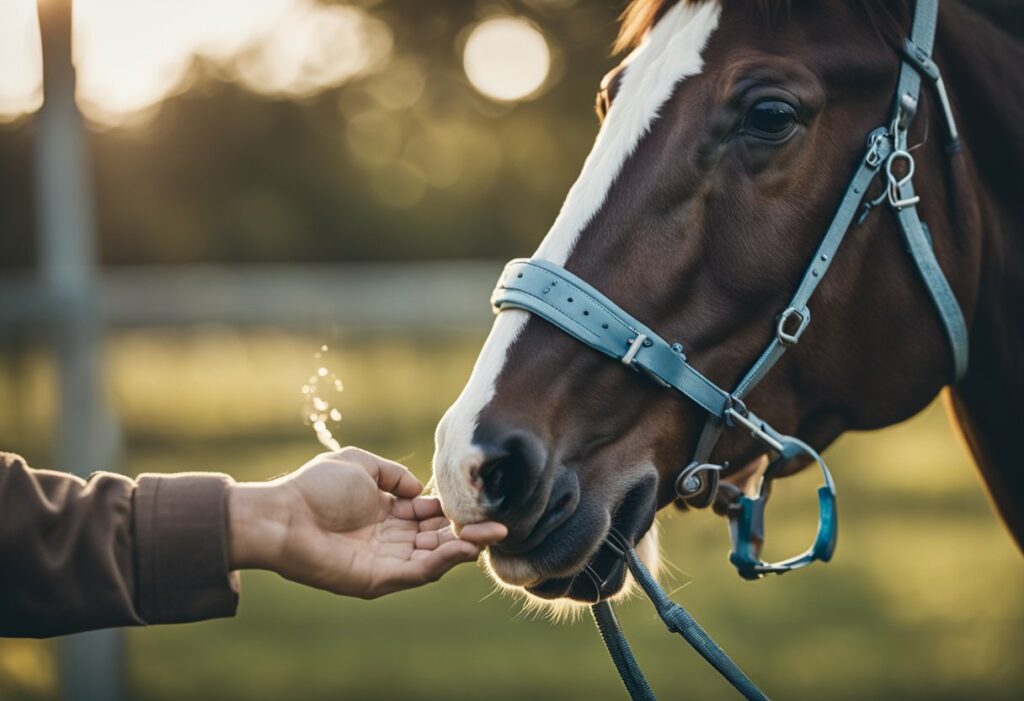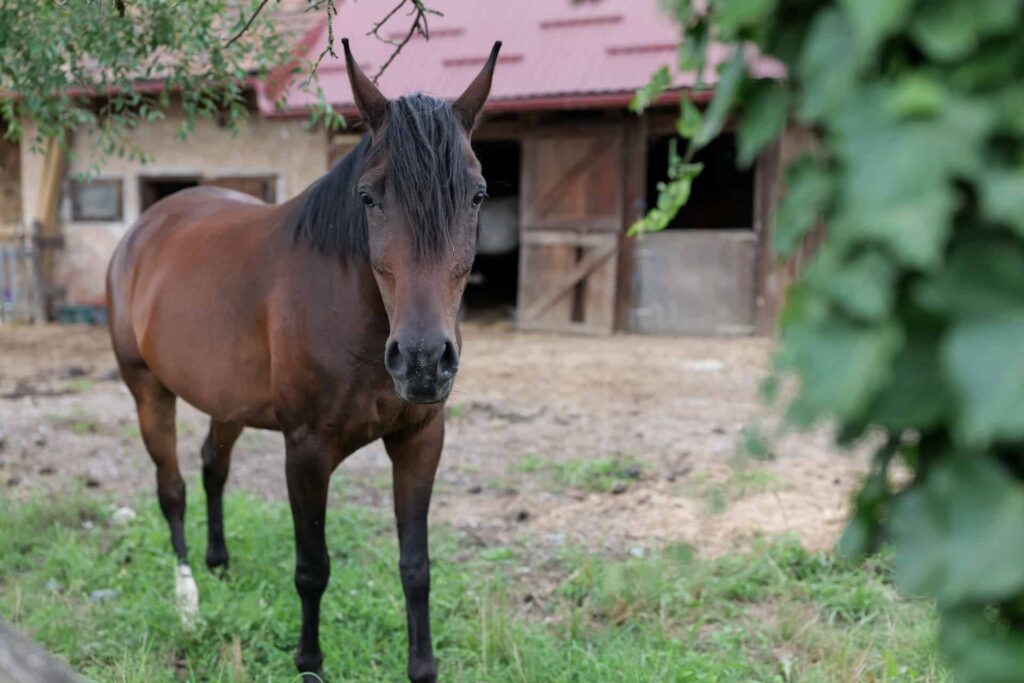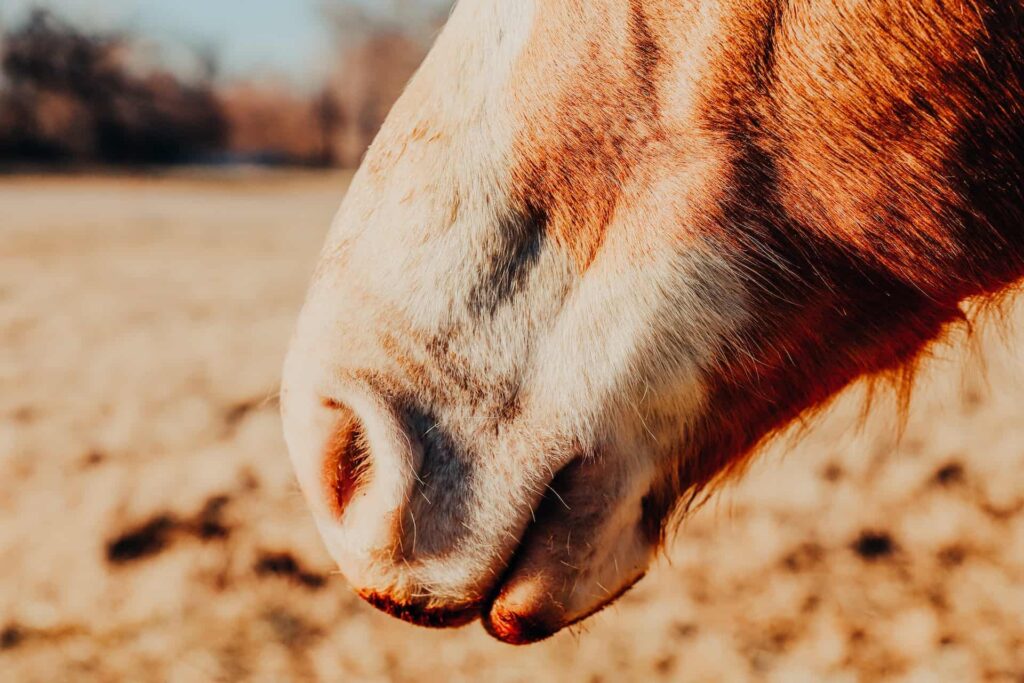Horse deworming is a crucial aspect of maintaining the health and well-being of horses. It involves the use of anthelmintic medications to eliminate various internal horse parasites such as strongyles, ascarids, tapeworms, and pinworms. These parasites can cause a range of health issues in horses, including weight loss, poor coat condition, colic, and even death in severe cases. A proper deworming program is critical to long-term horse health and performance.
There are numerous factors to consider when implementing a deworming program for horses, such as the type of dewormer, the frequency and schedule of administration, and assessing the parasite load in individual horses and the environment. It is crucial to understand the life cycle of various parasites, as well as the potential for drug resistance, which can impact the effectiveness of deworming treatments.
The role of the horse’s age, health status, and pasture management in parasite control and the need for veterinary involvement must also be acknowledged to create a successful deworming strategy.
Key Takeaways
- Deworming for a horse’s health involves using appropriate medications to eliminate different internal parasites.
- A successful deworming program considers factors such as the type of dewormer, frequency, and schedule, assessing parasite load, and understanding drug resistance.
- The horse’s age, health status, pasture management, and involvement of a veterinarian are crucial aspects of an effective deworming strategy.
Why Deworming is Important
Deworming plays a crucial role in maintaining a horse’s health, as it helps protect the animal against internal parasites. Horses of all ages can be affected by parasitic infections, and if left untreated, these infections may result in severe complications or even death.
One common category of internal parasites that affect horses is strongylids. These parasites can be present in large numbers, causing considerable damage to the horse’s digestive system and overall well-being 1. To minimize the impact of such parasitic infections, it is necessary to implement regular deworming programs for horses.
A well-designed deworming program can help prevent the growth and spread of these parasites within the horse population. This, in turn, reduces the risk of parasitic disease transmission and allows the horses to lead healthier, more productive lives. Various factors can influence the effectiveness of a deworming program, including the horse’s age, breed, and frequency of treatments.
By taking these factors into consideration, horse owners and veterinarians can develop a deworming regimen tailored to the specific needs of each animal.
It’s important to monitor the horse’s health regularly. This can be done through fecal egg count tests that help identify the horses with higher parasite burdens, allowing for targeted treatments. In doing so, the deworming program becomes more efficient and ensures that the horses receive the appropriate dosage and type of anthelmintic medication needed to combat the parasites.
Deworming is a vital part of horse healthcare management, specifically aimed at controlling internal parasites and minimizing the risks of parasitic diseases. With regular monitoring and well-planned deworming programs in place, horse owners and veterinarians can effectively maintain the health and well-being of their equine companions.
Understanding Horse Parasites
Horse parasites are a common concern for horse owners, as they can cause significant health issues and negatively impact the horse’s overall well-being. Parasites in horses come in various forms, including tapeworms, strongyles, ascarids, roundworms, and pinworms. Each of these parasites poses unique challenges for both detecting and treating them.
Tapeworms (Anoplocephala Perfoliata) are flat, ribbon-like worms that attach to the horse’s intestine and absorb nutrients. They can cause problems such as weight loss, colic, and even intestinal blockages if left untreated. Tapeworms are typically transmitted via oribatid mites, which are found in pastures and consumed while the horse grazes.
Strongyles are a leading cause of illness in horses, as these worms can damage blood vessels and impair the functioning of the horse’s digestive system. They are commonly referred to as either large or small strongyles and are capable of causing severe damage to the horse’s intestines. Strongyles are transmitted through the ingestion of infective larvae present on pasture grasses.
Ascarids (Parascaris Equorum), also known as roundworms, are large, white worms that primarily afflict young horses under two years of age. These internal parasites can obstruct the horse’s intestines, causing impactions, and may even lead to pneumonia when ingested larvae migrate to the lungs. Ascarids are commonly spread through the consumption of infective eggs found in manure, soil, and contaminated feed.
Pinworms (Oxyuris equi) are small, thin worms that are known to cause severe itching and discomfort, specifically around the horse’s tail region. While pinworms rarely lead to serious complications, they can result in discomfort for the horse, leading to rubbing and self-inflicted hair loss. These parasites are spread through direct contact with infected horses, contaminated surfaces, and grooming tools.
Understanding horse parasites is crucial for the welfare of the horse. Each type of parasite poses unique challenges. Regular deworming routines and responsible pasture management are vital for minimizing risks and protecting the horse’s health.
Types of Dewormers
Deworming horses helps in preventing parasite infestations and safeguarding their overall health. Various deworming products, also known as anthelmintics, are available for horse owners and veterinarians to choose from. These products differ in their active ingredients and target specific groups of parasites. Some of the commonly used deworming products include ivermectin, moxidectin, fenbendazole, praziquantel, pyrantel, and oxibendazole.
Ivermectin is a widely used dewormer that is effective against most common equine parasites like strongyles, ascarids, and pinworms. It is available in various formulations, such as injectable, oral paste, and gel. Popular brands containing ivermectin include Zimectrin and Equimax.
Moxidectin is another potent anthelmintic that targets a variety of equine parasites. It works by disrupting the nervous system of the parasites, eventually killing them. Moxidectin is the active ingredient in products like Quest. Compared to ivermectin, moxidectin has a more extended residual activity and is effective in controlling encysted small strongyles.
Fenbendazole is useful in treating roundworms, strongyles, and pinworms by inhibiting their microtubules and starving the parasites. However, this dewormer requires a higher dosage and is less effective against adult parasites. It is often given as a multi-day treatment for encysted small strongyles.
Praziquantel specifically targets tapeworms in horses. It works by damaging the parasite’s skin, causing the worm to lose its grip on the intestinal wall and be eliminated through the digestive system. Praziquantel is often combined with ivermectin or moxidectin in products like Equimax and Quest.
Pyrantel is a versatile dewormer that is effective against both large and small strongyles, as well as roundworms and pinworms. This dewormer comes in different formulations, including oral paste, gel, and injectable forms. The dosage requirement for pyrantel depends on the targeted parasites and it often requires multiple treatments to be effective.
Oxibendazole serves as an effective treatment for a wide range of equine parasites, including strongyles, roundworms, and pinworms, by inhibiting their metabolic processes. It is available as an oral paste or granules that can be top-dressed on feed.
Deworming products play a crucial role in maintaining the health of horses. By understanding the different types of dewormers and their respective targets, horse owners and veterinarians can select the most appropriate anthelmintic for their equine population. Regular rotation of deworming products and adherence to proper usage guidelines can help slow down the development of parasite resistance to these treatments.
Deworming Frequency and Schedule
Developing a suitable horse worming schedule relies on understanding the different factors influencing parasite populations that can affect horses at various times of the year. Typically, a deworming schedule comprises treatments in spring, summer, fall, and winter. In many cases, horses may be dewormed at least twice a year. For instance, adult horses might receive treatments during spring and fall, while foals could be dewormed up to four times within their first year.
In spring, usually around June, administering deworming treatment is crucial since the warmer weather causes increased pasture grazing and a higher risk for parasite infestations. During the summer months, it is essential to monitor the horses and deworm if necessary, usually basing this decision on fecal egg counts to determine the need for treatment.
Late summer and early fall, typically around September, deworming treatments are essential to address the potential rise of strongyles, one of the most common internal parasites affecting horses. Late fall is another critical period to consider deworming, particularly targeting tapeworms and encysted small strongyles. Many parasites become more prevalent during winter months due to decreased pasture quality and an increased time spent in indoor confinements.
It is important to consider that the frequency of deworming treatments should be tailored to each horse and their environment, as individual factors, such as age and breed, may influence strongyle communities. Following targeted deworming strategies and conducting regular fecal egg counts will help to reduce the likelihood of parasite resistance to anthelmintic treatments.
By adapting the deworming schedule to consider seasonal changes and specific needs, horse owners can ensure the health and well-being of their equines, maintaining a proactive approach to preventing and treating internal parasite infestations.
Assessing Parasite Load
To effectively manage parasite control in horses, it is essential to assess the parasite load within the animal. One commonly used method for determining this load is through a fecal egg count (FEC). This test measures the number of parasite eggs present in a horse’s manure, which is then expressed as eggs per gram (EPG) of feces.
Collecting a fresh manure sample from the horse and submitting it to a laboratory for analysis enables the calculation of the EPG. This value is useful for categorizing horses into different shedding groups: low shedders, moderate shedders, and high shedders. These categories can help horse owners make informed decisions regarding deworming strategies and overall parasite management.
Low shedders are horses with an EPG of less than 200, indicating a relatively low parasite burden. These horses generally have a strong immunity against parasites and may require less frequent deworming treatments. On the other hand, moderate shedders have an EPG of 200-500, suggesting a moderate parasite load and a need for regular deworming. Finally, high shedders have an EPG greater than 500, reflecting a high level of parasite egg shedding, and may necessitate more aggressive deworming interventions.
It is essential to note that FEC is not the sole indicator of a horse’s parasite load. Other factors, such as age, immune status, and environmental conditions, also influence the parasite burden. For this reason, it is crucial to work with a veterinarian to develop an individualized deworming program tailored to the specific needs of each horse.
Assessing parasite load in horses is a critical aspect of effective parasite management. Utilizing techniques like fecal egg count testing can help determine the appropriate deworming strategy and maintain the overall health and well-being of the horse population.
Role of Horse’s Age and Health Status
The age and overall health of a horse play a significant role in determining the frequency and approach to deworming. In general, adult horses have a better immune system and are better equipped to resist parasite infections compared to younger horses like foals and ponies.
Adult horses typically require less frequent deworming as their immune system is stronger, while foals and younger horses demand more frequent and careful monitoring for signs of infection. This is because younger horses have a higher risk of acquiring parasites, which can lead to numerous health issues, including diarrhea, weight loss, and poor hair coat quality.
Mares, in particular, may need specific attention regarding their deworming schedule. This is especially crucial during pregnancy, as the health of the unborn foal can be impacted by the mare’s parasite load. Pregnant mares must receive appropriate and timely deworming treatment to ensure both the mare’s health and that of the foal.
In order to establish an effective deworming program, it is crucial to consider the individual horse’s age, current health status, and any existing risk factors. Some horses may require more aggressive or frequent deworming treatments, while others may thrive with a less intensive approach. Monitoring the horse’s hair coat quality, gastrointestinal health, and overall well-being is essential in maintaining a successful deworming schedule.
Taking into account a horse’s age and health status when determining a deworming program enables a more targeted and appropriate treatment plan. This ensures that each horse, whether adult, mare, pony, or foal, receives the necessary care that suits their unique needs and helps maintain their overall health and well-being.
Role of a Veterinarian
A veterinarian plays a crucial role in the management and prevention of intestinal parasites in horses. They not only provide advice and guidance on the best deworming practices but also help horse owners create a tailored parasite control program based on the specific needs of their horses.
Veterinarians conduct fecal egg count tests to determine the parasite burden in a horse and evaluate the effectiveness of the deworming treatment. By regularly monitoring the horse’s health and parasite load, they can identify the most suitable deworming products and intervals, thereby minimizing the risk of parasite resistance to medications.
In addition to prescribing the appropriate deworming medication, veterinarians assist in educating horse owners about the importance of proper pasture management and hygiene. This includes strategies such as regular mucking out of stalls, rotational grazing, and avoiding overcrowding to reduce the risk of parasitic infections in the horse population.
Moreover, veterinarians play an essential role in facilitating communication between horse owners, ensuring that any critical information regarding parasite control and deworming practices is correctly understood and implemented. They can also provide updates on regional parasite resistance patterns and new deworming guidelines to help horse owners stay current and make evidence-based decisions for their horses’ long-term health.
The role of a veterinarian in horse deworming is multifaceted, encompassing diagnostics, treatment recommendations, education, and ongoing collaboration with horse owners. By working closely with a skilled veterinarian, horse owners can take the necessary steps to maintain the health and well-being of their animals while effectively managing parasites and minimizing the risk of resistance.
Understanding Drug Resistance
Drug resistance is an emerging global problem, particularly in the context of equine parasites. The development of resistance is often due to factors such as the high frequency of deworming and the continued use of specific treatments without proper management strategies. This has become an ever-increasing concern in the world of equine health (source).
One specific issue is anthelmintic resistance, which refers to the resistance of parasites to the drugs designed to eliminate them. This type of resistance has been found in the nematodes of horses (source). In order to slow down the development and spread of such resistance, researchers and veterinarians must first gain a deeper understanding of the biology of the parasites.
Some strategies to decelerate the selection of drug resistance include reducing the frequency of deworming treatments, especially in adult horses, as well as developing new treatments that target various aspects of parasitic life cycles (source). In addition, monitoring the effectiveness of current treatments and adjusting protocols according to the findings can contribute to slowing down resistance progression.
In order to overcome drug resistance for macro parasites, research is also focusing on identifying new drug targets and compounds. For instance, examining the genetics of resistant parasites can provide insight into possible avenues for reversing resistance (source). Another approach is to implement integrated control methods, such as combining drug treatments with non-chemical alternatives like pasture management and selective breeding for genetic resistance.
By understanding drug resistance and its underlying mechanisms in equine parasites, the equine industry and veterinary professionals can develop more effective and sustainable solutions for managing parasite infections in horses. However, the importance of collaboration and a unified approach among researchers, veterinarians, and horse owners cannot be overstated. Together, they can work towards ensuring the health and well-being of horses worldwide.
Importance of Pasture Management

Pasture management is a crucial aspect of an effective parasite control program for horses. Proper maintenance of pastures can reduce the risk of infection and help maintain the overall health of your horses. This includes managing manure piles, implementing controlled grazing practices, and the effective use of deworming treatments.
Manure piles can serve as a breeding ground for parasites, as they host the larvae of various intestinal worms. Regular removal of manure from pastures is important in reducing the worm burden in the environment. In addition, it is recommended to compost the manure before spreading it on fields, as the heat produced during composting can kill many of the parasite larvae present in the manure.
Controlled grazing practices can also aid in minimizing parasite infestation in horses. Rotating pastures and implementing a “rest” period for each section can disrupt the life cycle of parasites. Furthermore, the introduction of different animal species, such as sheep or cattle, on the pasture can help break the life cycle of horse-specific parasites, as these animals often do not share the same parasite species.
Effective pasture management is essential for a successful parasite control program in horses. Regular deworming treatments should be integrated with these practices to maintain the health of your horses. Deworming frequency should be tailored according to the individual horse’s needs, as well as the farm’s management practices. Conducting fecal egg count testing before administering deworming treatments can help determine the appropriate frequency and type of treatment required.
Proper pasture management plays a significant role in maintaining the health of horses and controlling intestinal parasite infestations. By following these practices, horsekeepers can ensure that their horses remain healthy and are less susceptible to parasitic infections.
Different Parasitic Diseases
Horses are susceptible to a variety of parasitic diseases, which can potentially cause severe health issues if not properly managed. One such disease is colic, a gastrointestinal disorder that can result from a parasite infection. Horses with colic may exhibit symptoms such as abdominal discomfort, rolling, and excessive gas production.
Another common parasitic infection in horses is strongylid infection. Strongylids are a group of parasites that infest the gastrointestinal tracts of horses, potentially causing damage to the blood vessels and intestinal tissues. These parasites can significantly affect the overall health of the horse, leading to weight loss, poor coat condition, and even death in severe cases.
In addition to colic and strongylid infection, horses are also prone to ascarid infestations. Ascarids are large, roundworms that can cause damage to the horse’s intestines, liver, and lungs. Young horses are particularly susceptible to ascarid infections and may experience poor growth, respiratory issues, and intestinal blockage as a result.
Effective deworming practices are crucial in managing these parasitic diseases and ensuring the health of horses. Different deworming programs aim to target specific parasites and reduce the risk of disease transmission among horses on the same farm. It is essential to follow an appropriate deworming schedule based on the horse’s age, breed, and health status.
| Disease | Parasite | Symptoms | Treatment |
|---|---|---|---|
| Colic | Various, including strongylids and ascarids | Abdominal discomfort, rolling, excessive gas | Deworming medications, pain management, hydration |
| Strongylid infection | Strongylids | Weight loss, poor coat condition, intestinal damage | Deworming medications, proper pasture management |
| Ascarid infestation | Ascarids | Poor growth, respiratory issues, intestinal blockage | Deworming medications, targeted treatment for young horses |
It is important for horse owners and caretakers to be aware of the different parasitic diseases that can affect their animals. Colic, strongylid infection, and ascarid infestations are just a few examples of diseases that can result from parasite infections in horses. Following proper deworming practices and consulting with a veterinarian is essential in maintaining horse health and preventing these disease occurrences.
Research and Resources
Current Research
Recent studies have highlighted the importance of strategic deworming in horses as opposed to using pre-established protocols, which may lead to low efficacy and unnecessary treatments. A study found that unnecessary exposure to anthelmintics can lead to a waste of resources and low efficacy.
The University of Kentucky is one of the prominent institutions researching horse deworming strategies and health. They work closely with the American Association of Equine Practitioners (AAEP) to develop effective and evidence-based practices. AAEP is a highly regarded organization that plays a crucial role in conducting and disseminating research on horse health, including parasite control and deworming strategies.
In another research study conducted in Sweden, the effect of different anthelmintics on cyathostomins in horses was examined in field conditions. The study provided valuable insights into the variations in the effectiveness of different deworming treatments.
Online Guides and Tips
To help horse owners make informed decisions regarding deworming, there are several online resources that provide guidelines and tips. The American Association of Equine Practitioners offers a comprehensive guide for internal parasite control in horses, covering factors such as strategic deworming plans, environmental management, and resistance issues.
For those interested in specific methods and techniques, the University of California’s Integrated Pest Management program provides practical advice on grazing management, rotational grazing, and anthelmintic usage tailored to a horse’s specific needs.
Frequently Asked Questions
How often should horses be dewormed?
The ideal deworming frequency for horses can vary depending on factors such as age, lifestyle, and local parasite prevalence. A study in Germany found that adult horses were often dewormed 1-4 times per year. However, it is essential to consult with a veterinarian to determine the best deworming schedule for individual horses.
Which dewormer is most effective for horses?
The effectiveness of a dewormer depends on the parasites present and regional resistance patterns. It is common practice to rotate between different classes of dewormers to help prevent resistance. Consult with a veterinarian to determine the most effective deworming agent for your horse, taking into account factors such as fecal egg counts and local parasite management recommendations.
What is the recommended deworming schedule for foals?
Deworming schedules for foals differ from those for adult horses. The first deworming typically occurs between 2-3 months of age, followed by additional treatments at regular intervals. This schedule aims to manage parasites effectively as the foal’s immune system matures. Consult with a veterinarian to devise a tailored schedule for your foals.
How do regional factors affect horse deworming schedules?
Regional factors, including climate and parasite prevalence, influence deworming schedules. For example, the most common time for deworming in Sweden is spring and autumn, likely due to local parasite lifecycle patterns. To develop a suitable deworming plan for your horses, consider local climate and seasonal changes as well as consult with a veterinarian knowledgeable in regional parasite management.
Can I buy horse dewormers at Tractor Supply?
Yes, you can typically find a variety of horse dewormers at Tractor Supply stores and their online shop. It is important to remember that proper parasite management depends on more than just selecting a dewormer. Consult with a veterinarian to develop an effective, tailored deworming schedule for your horses.
Are there alternative methods to chemical deworming for horses?
Some horse owners explore alternative methods for parasite control, such as using herbal preparations or supporting their horses’ immune systems with proper nutrition. The efficacy of these methods has not been thoroughly studied. However, it is crucial to regularly monitor your horses’ parasite load, using tools like fecal egg counts and seeking veterinary guidance to ensure their health and well-being.
Last Updated on October 19, 2023 by Nate Dewsbury




I have a couple of questions related to worming in a small boarding facility.
1. Is it best practice, regardless of fecal count, to have all horses on the same worming schedule and using the same dewormer?
2. If False, please explain best practices to ensure owners are making informed deworming decisions.